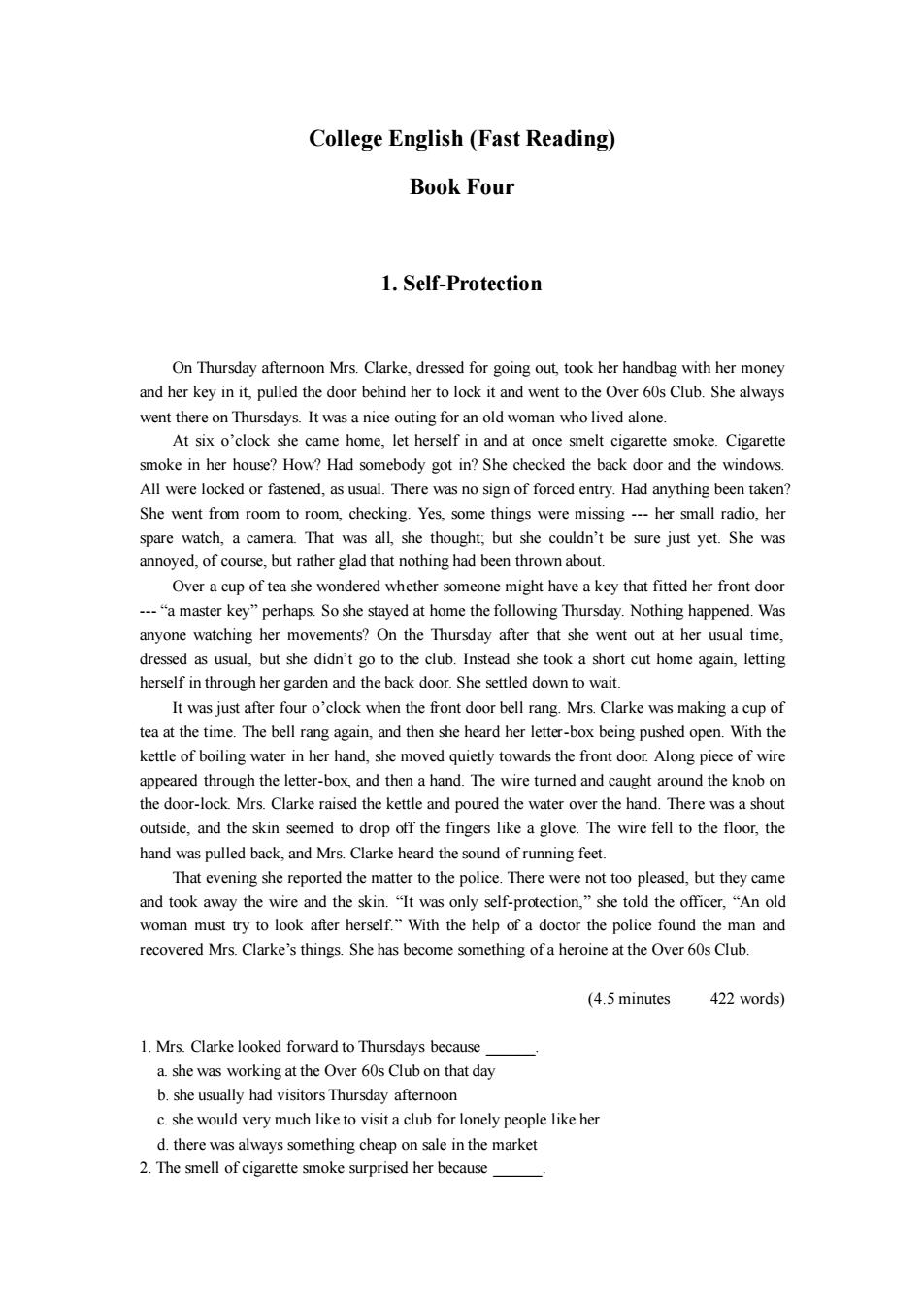
College English (Fast Reading) Book Four 1.Self-Protection On Thursday afternoon Mrs.Clarke,dressed for going out,took her handbag with her money and her key in it.pulled the door behind her to lock it and went to the Over 60s Club.She always went dyslrwasanioeoutingfocanoldwomanwholvedadons At six o'clock she came home,let herself in and at once smelt cigarette smoke.Cigarette smoke in her house?How?Had somebody got in?She checked the back door and the windows. All were locked or fastened,as usual.There was no sign of forced entry.Had anything been taken? She went from room to room.checking.Yes.some things were missing---her small radio.her spare watch,a camera That was all she thought,but she couln't be sure just yet.She was but rather glad that n th wn abou Over a cup of tea she wondered whether someone might have a key that fitted her front door ---"a master key"perhaps.So she stayed at home the following Thursday.Nothing happened.Was anyone watching her movements?On the Thursday after that she went out at her usual time, dressed as usual,but she didn't go to the club.Instead she took a short cut home again,letting herself in through her the back oor.She It was just after four o'clock when the front door bell rang.Mrs.Clarke was making a cup of tea at the time.The bell rang again,and then she heard her letter-box being pushed open.With the kettle of boiling water in her hand,she moved quietly towards the front door.Along piece of wire was a shout outside,and the skin smed to drop off the fingers likea glove. The wire fell to the floor.the hand was pulled back,and Mrs.Clarke heard the sound of running feet. That evening she reported the matter to the police.There were not too pleased,but they came and took away the wire and the skin."It was only self-protection."she told the officer."An old woman must try to look after herself."With the help of a doctor the police found the man and recovered Mrs.Clarke's things.She has become something ofa heroine at the Over60s Club. (4.5 minutes 422 vords】 1.Mrs.Clarke looked forward to Thursdays because a.she was working at the Over 60s Clubon that day c.she would very much like to visit a club for lonely people like her d.there was always something cheap on sale in the market 2.The smell of cigarette smoke surprised her because
College English (Fast Reading) Book Four 1. Self-Protection On Thursday afternoon Mrs. Clarke, dressed for going out, took her handbag with her money and her key in it, pulled the door behind her to lock it and went to the Over 60s Club. She always went there on Thursdays. It was a nice outing for an old woman who lived alone. At six o’clock she came home, let herself in and at once smelt cigarette smoke. Cigarette smoke in her house? How? Had somebody got in? She checked the back door and the windows. All were locked or fastened, as usual. There was no sign of forced entry. Had anything been taken? She went from room to room, checking. Yes, some things were missing --- her small radio, her spare watch, a camera. That was all, she thought; but she couldn’t be sure just yet. She was annoyed, of course, but rather glad that nothing had been thrown about. Over a cup of tea she wondered whether someone might have a key that fitted her front door --- “a master key” perhaps. So she stayed at home the following Thursday. Nothing happened. Was anyone watching her movements? On the Thursday after that she went out at her usual time, dressed as usual, but she didn’t go to the club. Instead she took a short cut home again, letting herself in through her garden and the back door. She settled down to wait. It was just after four o’clock when the front door bell rang. Mrs. Clarke was making a cup of tea at the time. The bell rang again, and then she heard her letter-box being pushed open. With the kettle of boiling water in her hand, she moved quietly towards the front door. Along piece of wire appeared through the letter-box, and then a hand. The wire turned and caught around the knob on the door-lock. Mrs. Clarke raised the kettle and poured the water over the hand. There was a shout outside, and the skin seemed to drop off the fingers like a glove. The wire fell to the floor, the hand was pulled back, and Mrs. Clarke heard the sound of running feet. That evening she reported the matter to the police. There were not too pleased, but they came and took away the wire and the skin. “It was only self-protection,” she told the officer, “An old woman must try to look after herself.” With the help of a doctor the police found the man and recovered Mrs. Clarke’s things. She has become something of a heroine at the Over 60s Club. (4.5 minutes 422 words) 1. Mrs. Clarke looked forward to Thursdays because ______. a. she was working at the Over 60s Club on that day b. she usually had visitors Thursday afternoon c. she would very much like to visit a club for lonely people like her d. there was always something cheap on sale in the market 2. The smell of cigarette smoke surprised her because ______

a she had not taken her cigarettes with her that dav b.she remembered not having lefa cigarette buning c.she never smo ked herself d.she could not bear anyone smoking in her house 3.On the third Thursday Mrs.Clarke went out at her usual time a because she didn't want to miss the club again b.tose if the thief was hanging .to the forgetting about that thef d.in an attempt to trick the thief 4.The lock on the front door was one which a.needed a piece of wire to open it b.could be opened from inside without a key .coun'be opened without a key d.used a knob instead of a key 5.The thief was arrested and Mrs.Clarke's things recovered after a he went to have his hand treated as a clinic b.the police found his fingerprintson the wire he co pained tothe policeabou upon him gave the policeadetailed thef 6.Which of the following is true? a.Every Thursday afternoon Mrs.Clarke went to a club for lonely people. b.Mrs.Clarke strongly believed that a small radio.a watch and a camera were all the things she lost in the theft. d.Theold lady used a glove of man-made skin as a weapon for self-protection
a. she had not taken her cigarettes with her that day b. she remembered not having left a cigarette burning c. she never smoked herself d. she could not bear anyone smoking in her house 3. On the third Thursday Mrs. Clarke went out at her usual time ______. a. because she didn’t want to miss the club again b. to see if the thief was hanging about outside c. to the club, entirely forgetting about that unpleasant theft d. in an attempt to trick the thief 4. The lock on the front door was one which ______. a. needed a piece of wire to open it b. could be opened from inside without a key c. couldn’t be opened without a key d. used a knob instead of a key 5. The thief was arrested and Mrs. Clarke’s things recovered after _____. a. he went to have his hand treated as a clinic b. the police found his fingerprints on the wire c. he complained to the police about the wound inflicted upon him d. the old lady gave the police a detailed description of the thief 6. Which of the following is true? a. Every Thursday afternoon Mrs. Clarke went to a club for lonely people. b. Mrs. Clarke strongly believed that a small radio, a watch and a camera were all the things she lost in the theft. c. On the third Thursday, Mrs. Clark went out and then returned home by taking another route. d. The old lady used a glove of man-made skin as a weapon for self-protection
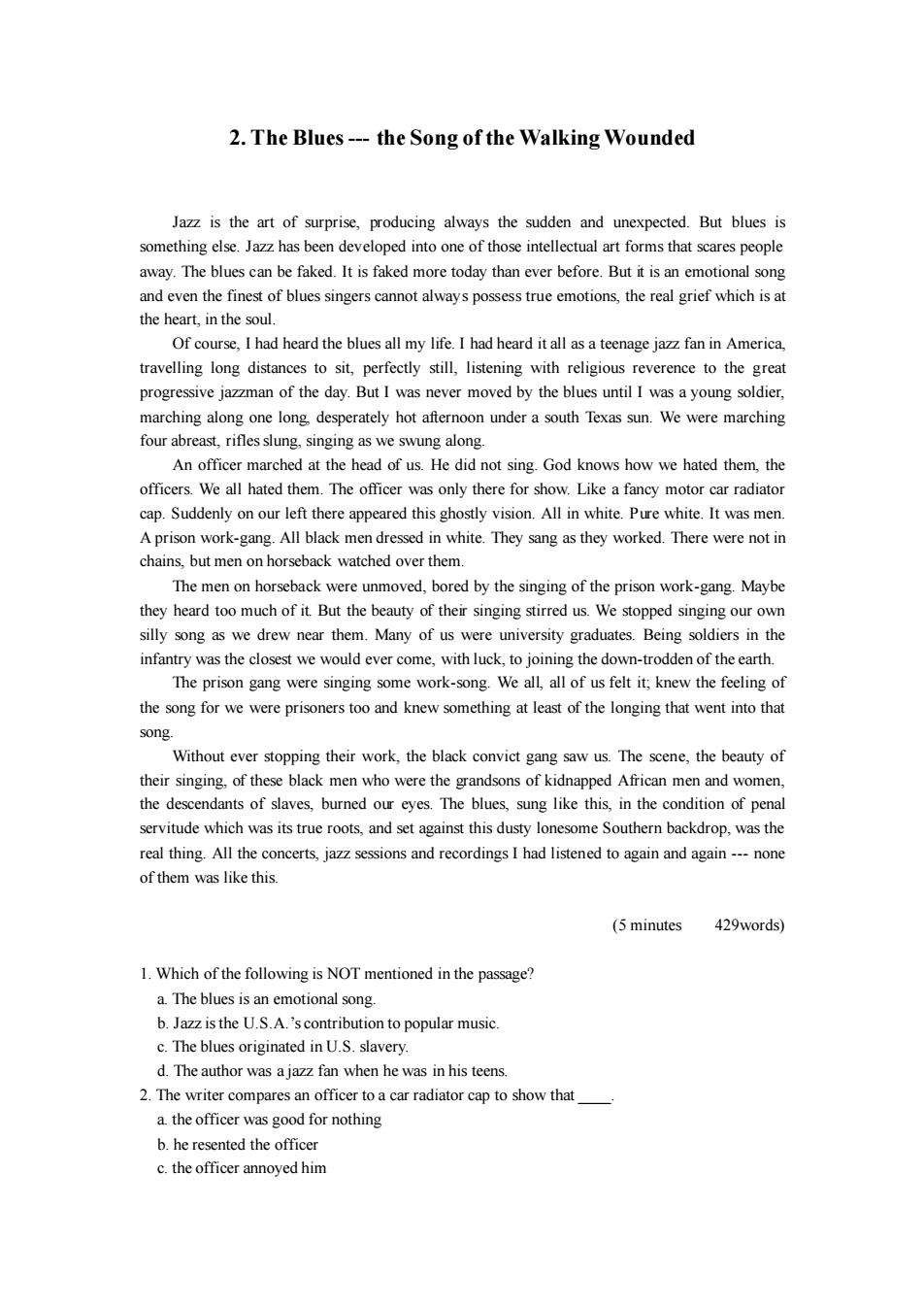
2.The Blues---the Song of the Walking Wounded Jazz is the art of surprise.producing always the sudden and unexpected.But blues is something else.Jazz has been developed into one of those intellectual art forms that scares people cbe faked.tsare tody tha verbeforeu of blues singers cannot always possess true emotions,the real grief which isa the heart,in the ou Of course,I had heard the blues all my life.I had heard it all as a teenage jazz fan in America. travelling long distances to sit,perfectly still,listening with religious reverence to the great progressive jazzman of the day.But I was never moved by the blues until I was a young soldier. marching l one long desperately hot under a south Texas sun We were marching four abreast.rifess ung,singing as we swung along. An officer marched at the head of us.He did not sing.God knows how we hated them,the officers.We all hated them.The officer was only there for show.Like a fancy motor car radiator cap.Suddenly on our left there appeared this ghostly vision.All in white.Pure white.It was men. dressed in white.They sang as they worked.There were not in horseback watched over The men on horseback were unmoved,bored by the singing of the prison work-gang.Maybe they heard too much of it But the beauty of their singing stirred us.We stopped singing our own silly song as we drew near them.Many of us were university graduates.Being soldiers in the infantry was the closest we would ever come.with luck.to joining the down-trodden of the earth. The prison gang were inging sor ork-son ll all of us felt it knew the feel ng the song for we were prisoners too and knew something at least of the longing that went into tha song. Without ever stopping their work,the black convict gang saw us.The scene,the beauty of their singing.of these black men who were the grandsons of kidnapped African men and women the des ndants of slaves,bured o eyes The blues,sung like this,in the condition of penal servitude hich was this backdrop.was the real thing.All the concerts,jazz sessions and recordings I had listened to again and again --none of them was like this. (5 minutes 429words) 1.Which of the following is NOT mentioned in the passage a.The blues is an emotional song. b.Jazz is the U.S.A.'s contribution to popular music c.The blues originated in U.S.slavery d.The author wasaja fan when he was in his teens 2.The writer compares an officer to a car radiator cap to show that a.the officer was good for nothing b.he resented the officer c.the officer annoyed him
2. The Blues --- the Song of the Walking Wounded Jazz is the art of surprise, producing always the sudden and unexpected. But blues is something else. Jazz has been developed into one of those intellectual art forms that scares people away. The blues can be faked. It is faked more today than ever before. But it is an emotional song and even the finest of blues singers cannot always possess true emotions, the real grief which is at the heart, in the soul. Of course, I had heard the blues all my life. I had heard it all as a teenage jazz fan in America, travelling long distances to sit, perfectly still, listening with religious reverence to the great progressive jazzman of the day. But I was never moved by the blues until I was a young soldier, marching along one long, desperately hot afternoon under a south Texas sun. We were marching four abreast, rifles slung, singing as we swung along. An officer marched at the head of us. He did not sing. God knows how we hated them, the officers. We all hated them. The officer was only there for show. Like a fancy motor car radiator cap. Suddenly on our left there appeared this ghostly vision. All in white. Pure white. It was men. A prison work-gang. All black men dressed in white. They sang as they worked. There were not in chains, but men on horseback watched over them. The men on horseback were unmoved, bored by the singing of the prison work-gang. Maybe they heard too much of it. But the beauty of their singing stirred us. We stopped singing our own silly song as we drew near them. Many of us were university graduates. Being soldiers in the infantry was the closest we would ever come, with luck, to joining the down-trodden of the earth. The prison gang were singing some work-song. We all, all of us felt it; knew the feeling of the song for we were prisoners too and knew something at least of the longing that went into that song. Without ever stopping their work, the black convict gang saw us. The scene, the beauty of their singing, of these black men who were the grandsons of kidnapped African men and women, the descendants of slaves, burned our eyes. The blues, sung like this, in the condition of penal servitude which was its true roots, and set against this dusty lonesome Southern backdrop, was the real thing. All the concerts, jazz sessions and recordings I had listened to again and again --- none of them was like this. (5 minutes 429words) 1. Which of the following is NOT mentioned in the passage? a. The blues is an emotional song. b. Jazz is the U.S.A.’s contribution to popular music. c. The blues originated in U.S. slavery. d. The author was a jazz fan when he was in his teens. 2. The writer compares an officer to a car radiator cap to show that ____. a. the officer was good for nothing b. he resented the officer c. the officer annoyed him
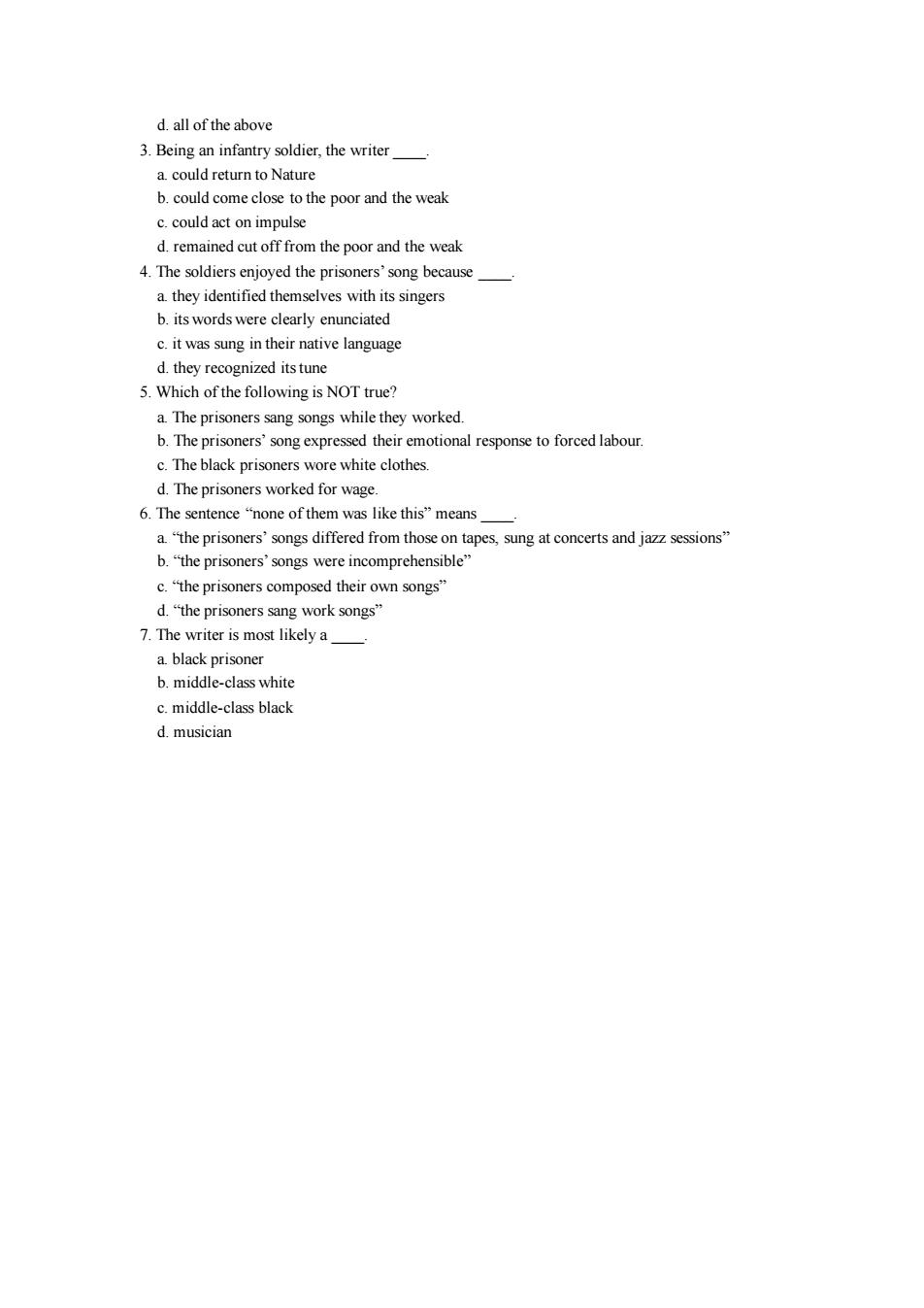
d.all of the above a.could return to Nature b.could come close to the poor and the weak c.could act on impulse d.remained cut off from the poor and the weak a.they identified themselves with its singers b.its words were clearly enunciated c.it was sung in their native language d.they recognized its tune 5.Which of the following is NOT true? b.The prisoners'song expressed their emotional response to forced labou c.The black prisoners wore white clothes d.The prisoners worked for wage 6.The sentence"none of them was like this"mean b."the prisoners'songs were incomprehensible c."the prisoners composed their own songs d."the prisoners sang work songs" 7.The writer is most likely a & swhit c.middle-class black d.musician
d. all of the above 3. Being an infantry soldier, the writer ____. a. could return to Nature b. could come close to the poor and the weak c. could act on impulse d. remained cut off from the poor and the weak 4. The soldiers enjoyed the prisoners’song because ____. a. they identified themselves with its singers b. its words were clearly enunciated c. it was sung in their native language d. they recognized its tune 5. Which of the following is NOT true? a. The prisoners sang songs while they worked. b. The prisoners’ song expressed their emotional response to forced labour. c. The black prisoners wore white clothes. d. The prisoners worked for wage. 6. The sentence “none of them was like this” means ____. a. “the prisoners’ songs differed from those on tapes, sung at concerts and jazz sessions” b. “the prisoners’songs were incomprehensible” c. “the prisoners composed their own songs” d. “the prisoners sang work songs” 7. The writer is most likely a ____. a. black prisoner b. middle-class white c. middle-class black d. musician
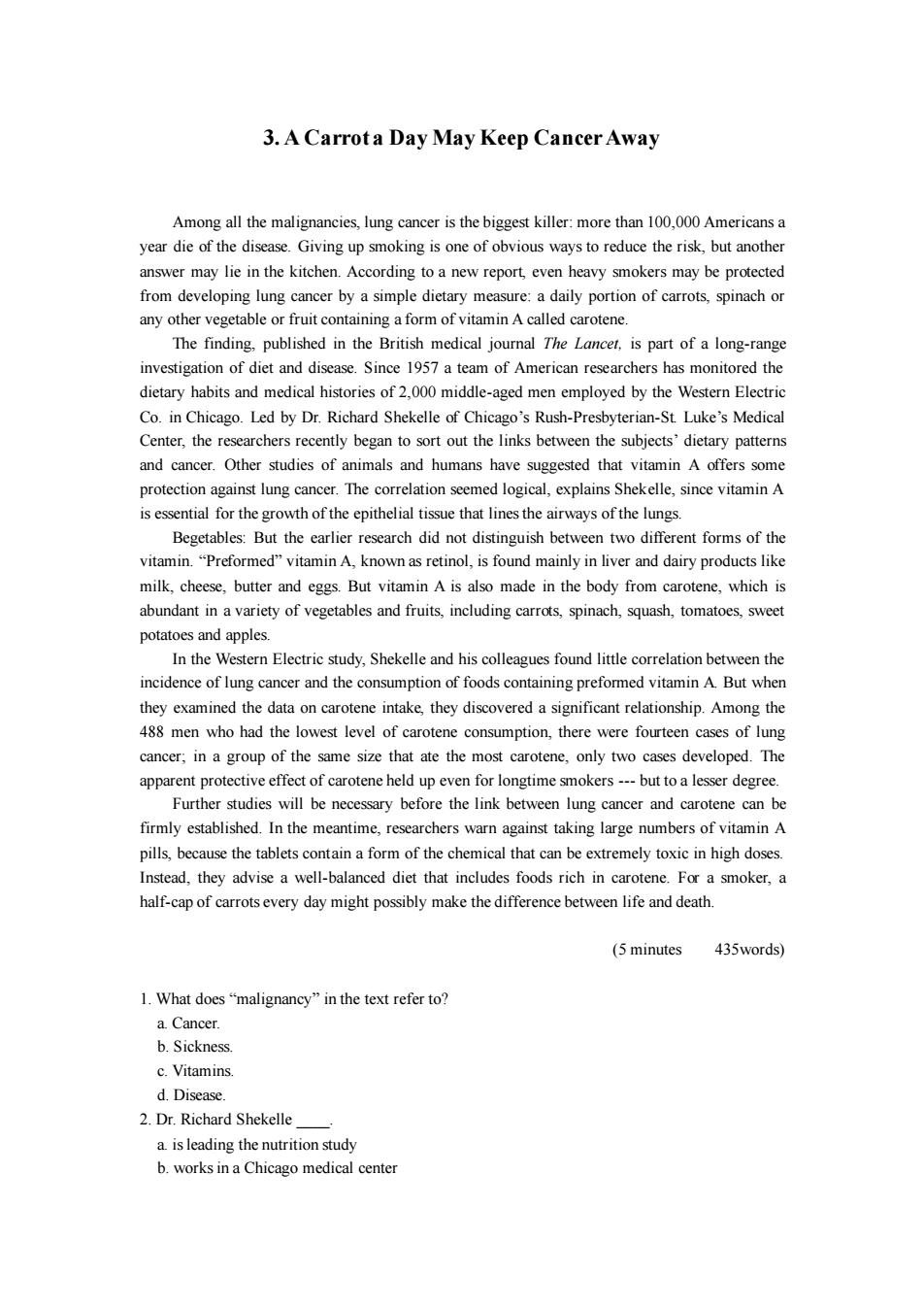
3.A Carrota Day May Keep Cancer Away Among all the malignancies.lung cancer is the biggest killer:more than 100.000 Americans a year die of the disease.Giving up smoking is one of obvious ways to reduce the risk,but another answer may lie in the kitchen.According toa new report even heavy smokers may be proected from developing lung cancer by a simple dietary me re:a daily portion inach o any other vegetable or fruit ofvitamin A called carotene. The finding,published in the British medical journal The Lancet.is part of a long-range investigation of diet and disease.Since 1957a team of American researchers has monitored the dietary habits and medical histories of 2.000 middle-aged men emploved by the Western Electric o.in Chicago.Led by Dr.Richard Shekelle f Chie o's Rush-Presbyte ian-St Luke's Medical Center,the researchers recently began to sor out the links between the subjects' di tary patterns and cancer.Other studies of animals and humans have suggested that vitamin A offers some protection against lung cancer.The correlation seemed logical,explains Shekelle,since vitamin A is essential for the growth of the epithelial tissue that lines the airways of the lungs. Begetables But the earlier research did not distinguish betv een two different forms of the vitamin ed" amin A. l is four m ly in liver rand dairy pro s like milk,cheese,butter and eggs.But vitamin A is also made in the body from carotene,which is abundant in a variety of vegetables and fruits,including carrots,spinach,squash,tomatoes,sweet potatoes and apples. In the Western Electric study,Shekelle and his colleagues found little correlation between the nci ence of lung erand the of foods c n A.But wher they examined the data on carotene intake,they discovered a significant relationship.Among the 488 men who had the lowest level of carotene consumption.there were fourteen cases of lung cancer;in a group of the same size that ate the most carotene,only two cases developed.The apparent protective effect of carotene held up even for longtime smokersbuttordegree. Further studies will be nece sary before the link bet ween lung cancer and carotene can b firmly established.In the meantime.researchers warn against taking large numbers of vitaminA pills,because the tablets contain a form of the chemical that can be extremely toxic in high doses Instead,they advise a well-balanced diet that includes foods rich in carotene.For a smoker,a half-cap of carrots every day might possibly make the difference between life and death. (5 minutes 435words) 1.What does"malignancy"in the text refer to? a.Cancer. h Sickness c.Vitamins d Diseas 2.Dr.Richard Shekelle a.is leading the nutrition study b.works in a Chicago medical center
3. A Carrot a Day May Keep Cancer Away Among all the malignancies, lung cancer is the biggest killer: more than 100,000 Americans a year die of the disease. Giving up smoking is one of obvious ways to reduce the risk, but another answer may lie in the kitchen. According to a new report, even heavy smokers may be protected from developing lung cancer by a simple dietary measure: a daily portion of carrots, spinach or any other vegetable or fruit containing a form of vitamin A called carotene. The finding, published in the British medical journal The Lancet, is part of a long-range investigation of diet and disease. Since 1957 a team of American researchers has monitored the dietary habits and medical histories of 2,000 middle-aged men employed by the Western Electric Co. in Chicago. Led by Dr. Richard Shekelle of Chicago’s Rush-Presbyterian-St. Luke’s Medical Center, the researchers recently began to sort out the links between the subjects’ dietary patterns and cancer. Other studies of animals and humans have suggested that vitamin A offers some protection against lung cancer. The correlation seemed logical, explains Shekelle, since vitamin A is essential for the growth of the epithelial tissue that lines the airways of the lungs. Begetables: But the earlier research did not distinguish between two different forms of the vitamin. “Preformed” vitamin A, known as retinol, is found mainly in liver and dairy products like milk, cheese, butter and eggs. But vitamin A is also made in the body from carotene, which is abundant in a variety of vegetables and fruits, including carrots, spinach, squash, tomatoes, sweet potatoes and apples. In the Western Electric study, Shekelle and his colleagues found little correlation between the incidence of lung cancer and the consumption of foods containing preformed vitamin A. But when they examined the data on carotene intake, they discovered a significant relationship. Among the 488 men who had the lowest level of carotene consumption, there were fourteen cases of lung cancer; in a group of the same size that ate the most carotene, only two cases developed. The apparent protective effect of carotene held up even for longtime smokers --- but to a lesser degree. Further studies will be necessary before the link between lung cancer and carotene can be firmly established. In the meantime, researchers warn against taking large numbers of vitamin A pills, because the tablets contain a form of the chemical that can be extremely toxic in high doses. Instead, they advise a well-balanced diet that includes foods rich in carotene. For a smoker, a half-cap of carrots every day might possibly make the difference between life and death. (5 minutes 435words) 1. What does “malignancy” in the text refer to? a. Cancer. b. Sickness. c. Vitamins. d. Disease. 2. Dr. Richard Shekelle ____. a. is leading the nutrition study b. works in a Chicago medical center

c.has been studving the links between food and cancer d.all of the above 3.Why did Dr.Shekelle think the correlation between vitamin A and lung cancer protection was logical? a vitamin a causes lung cancer b.Vitamin A cures lung cancer. c.VitaminA is neces ryfor the growth ofthe tissue liningthe lung ar d.VitaminA is a molecule that prevents smoke from being inhaled 4.Carotene is present in all of the following except a.tomatoes h carrots c.squash 5.Among the groups studied,who had the most cases of lung cancer? a.Those with the lowest level of carotene intake b.Those with the highest level of carotene intake. c.Those who ate only foods containing carotene d.Those with the lowest intake of .Why do arge a.The pills are hard to swallow. b.The pills contain a chemical that can be toxic in high doses c.The pills are expensive. d.The pills cause lung cancer
c. has been studying the links between food and cancer d. all of the above 3. Why did Dr. Shekelle think the correlation between vitamin A and lung cancer protection was logical? a. Vitamin A causes lung cancer. b. Vitamin A cures lung cancer. c. Vitamin A is necessary for the growth of the tissue lining the lungs. d. Vitamin A is a molecule that prevents smoke from being inhaled. 4. Carotene is present in all of the following except ____. a. tomatoes b. carrots c. squash d. butter 5. Among the groups studied, who had the most cases of lung cancer? a. Those with the lowest level of carotene intake. b. Those with the highest level of carotene intake. c. Those who ate only foods containing carotene. d. Those with the lowest intake of carrots. 6. Why do researchers warn against taking large numbers of vitamin A pills? a. The pills are hard to swallow. b. The pills contain a chemical that can be toxic in high doses. c. The pills are expensive. d. The pills cause lung cancer

4.Just the Job! Rodney Mace,35,is married with two young children,and is a part-time teacher of architectural history."Iam constantly surprised by other people's surprise.when they come to the gou the washing.Their eyes open wide at the sight of who comment too. His wife Jane,an Oxford graduate in modern languages,has a demanding full-time job.She is director of the Cambridge Home literacy scheme for adults in South London.Her working week involves several evenings and Saturdays.and at these times her husband is in sole charge of home and family. Apart m this.they share household jobs and employ a child-minder for the work:writing He has written several books and spends much of his time in the British Museum Reading Room,cycling there from his home in Brixton. People ask the Maces if they think that their children miss them.One can argue that satisfied parents generally have sisfied children but in any case the Maces are carefulto reerve time and energyto play with their children.And they have now developed ships ith othe adult and children.' Previously.Rodney Mace worked full-time and Jane only part-time.Then 18 months ago.the director of the literacy scheme left."It seemed to me that Jane was very well suited to do this job. She was very doubtful about it But I urged her to apply.She did.and she got Mace s that she needed th as s Did his male ego suffer from the change-over?Nothing like that occurred.But he still seem amazed at the way it changed his thinking "I felt that we were finally going to be partners.I fel enormous relief.I wasn't avoiding responsibility.but changing it Our relationship is so much better now.It has been a change for the good for both of us--I think for all of us,in every aspect of our lives i cannot ove emphasize that in every aspect.I think it is fundament that the works.The idea ofqua partnership if on partner doesn'work (4.5 minutes 406 words) 1.The article isabout a coupe whose married life is happier because a.they have a truly equal partnership b.the husband enjoys staying at home c thev earn more monev d.the wife has a full-time job 2.At one time,Rodney Mac a spent all his time writingbook b.taught architecture and history c.had a full-time job d.worked for the Cambridge House literacy scheme
4. Just the Job! Rodney Mace, 35, is married with two young children, and is a part-time teacher of architectural history, “I am constantly surprised by other people’s surprise, when they come to the house and see me cleaning a floor or hanging out the washing. Their eyes open wide at the sight of it! Much of the comment comes from men, but I am even more surprised at the number of women who comment too.” His wife Jane, an Oxford graduate in modern languages, has a demanding full-time job. She is director of the Cambridge Home literacy scheme for adults in South London. Her working week involves several evenings and Saturdays, and at these times her husband is in sole charge of home and family. Apart from this, they share household jobs and employ a child-minder for the afternoons. This enables him to teach two days a week and to do what he considers his principal work: writing. He has written several books and spends much of his time in the British Museum Reading Room, cycling there from his home in Brixton. People ask the Maces if they think that their children miss them. One can argue that satisfied parents generally have satisfied children, but in any case the Maces are careful to reserve time and energy to play with their children. “And they have now developed relationships with other adults and children.” Previously, Rodney Mace worked full-time and Jane only part-time. Then 18 months ago, the director of the literacy scheme left. “It seemed to me that Jane was very well suited to do this job. She was very doubtful about it. But I urged her to apply. She did, and she got it.” Jane Mace confirms that she needed this encouragement, as so many women initially do. Did his male ego suffer from the change-over? Nothing like that occurred. But he still seems amazed at the way it changed his thinking: “I felt that we were finally going to be partners. I felt enormous relief. I wasn’t avoiding responsibility, but changing it. Our relationship is so much better now. It has been a change for the good for both of us --- I think for all of us, in every aspect of our lives. I cannot overemphasize that: in every aspect. I think it is fundamental that the woman works. The idea of equal partnership is an illusion if one partner doesn’t work.” (4.5 minutes 406 words) 1. The article is about a couple whose married life is happier because ____. a. they have a truly equal partnership b. the husband enjoys staying at home c. they earn more money d. the wife has a full-time job 2. At one time, Rodney Mace ____. a. spent all his time writing books b. taught architecture and history c. had a full-time job d. worked for the Cambridge House literacy scheme
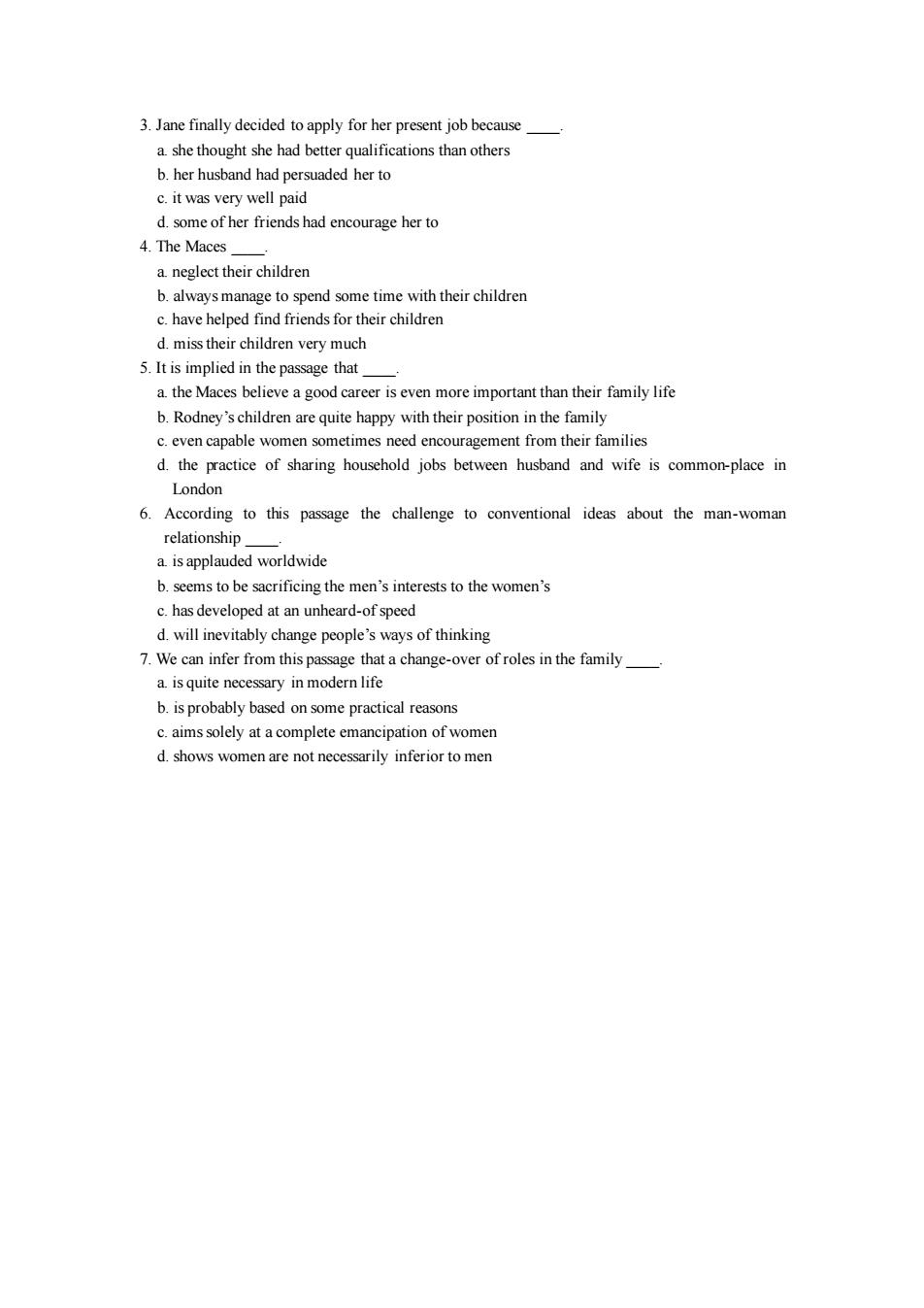
3.Jane finally decided to apply for her present job because b.her husband had persuaded her to c.it was very well paid d.some of her friends had encourage her to 4.The Maces a neglect their children c.have helped find friends for their children d.miss their children very much 5.It is implied in the passage that a the Maces believea good career important than their family life b.Rodney'schildren arequite happy with their position in the family c.even capable women sometimes need encouragement from their families d.the practice of sharing household jobs between husband and wife is common-place in London 6.According to this passage the challenge to conventional ideas about the man-woman aisapndaworidwidc b.scems to be sacrificing the men's interests to the women's c.has developed at an unheard-of speed d.will inevitably change people's ways of thinking 7.We can infer from this e that a change-over of roles in the family a is quite ne b.is probably based on some practical reasons c.aims solely at a complete emancipation of women d.shows women are not necessarily inferior to men
3. Jane finally decided to apply for her present job because ____. a. she thought she had better qualifications than others b. her husband had persuaded her to c. it was very well paid d. some of her friends had encourage her to 4. The Maces ____. a. neglect their children b. always manage to spend some time with their children c. have helped find friends for their children d. miss their children very much 5. It is implied in the passage that ____. a. the Maces believe a good career is even more important than their family life b. Rodney’s children are quite happy with their position in the family c. even capable women sometimes need encouragement from their families d. the practice of sharing household jobs between husband and wife is common-place in London 6. According to this passage the challenge to conventional ideas about the man-woman relationship ____. a. is applauded worldwide b. seems to be sacrificing the men’s interests to the women’s c. has developed at an unheard-of speed d. will inevitably change people’s ways of thinking 7. We can infer from this passage that a change-over of roles in the family ____. a. is quite necessary in modern life b. is probably based on some practical reasons c. aims solely at a complete emancipation of women d. shows women are not necessarily inferior to men
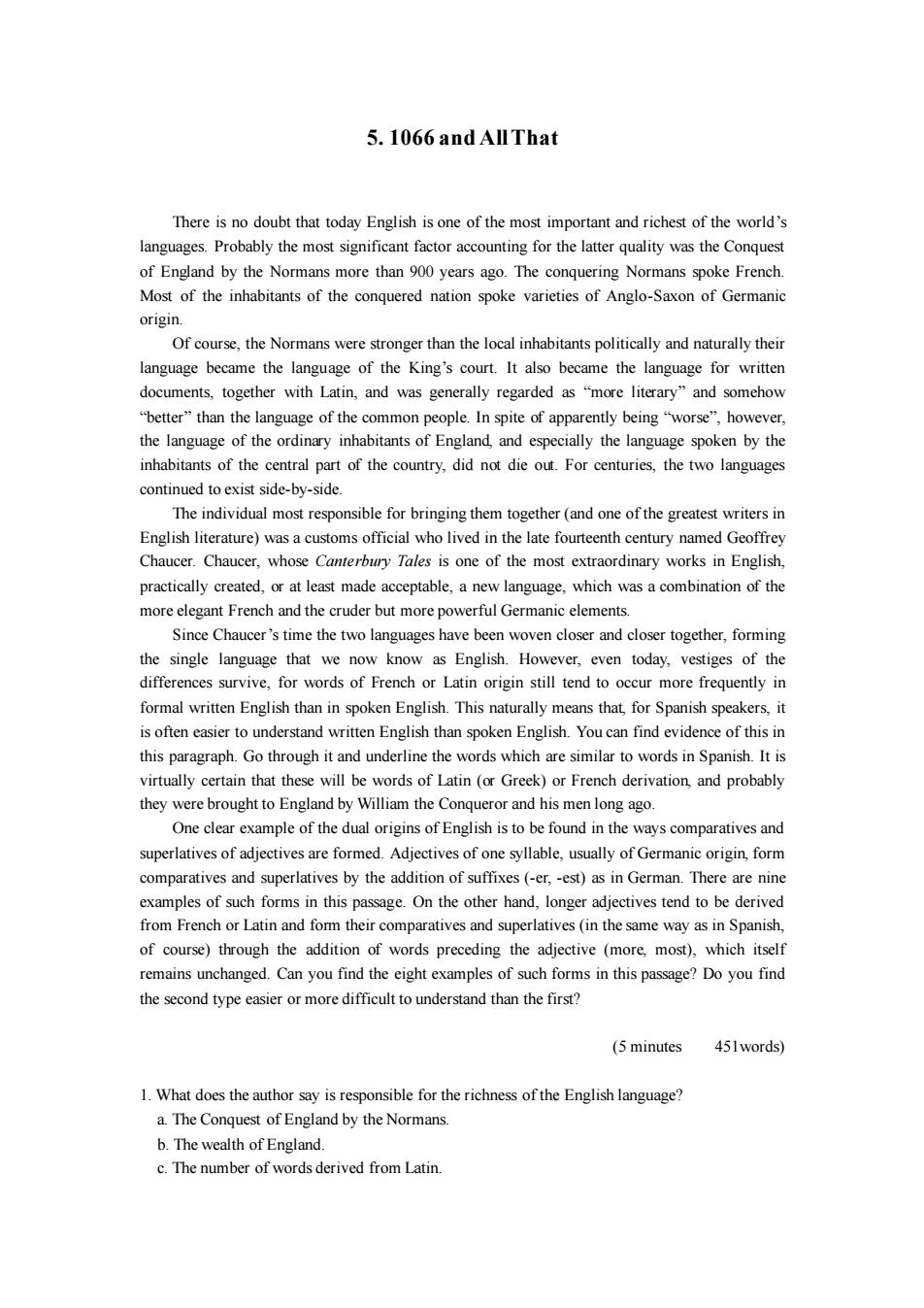
5.1066andAllThat There is no doubt that today English is one of the most important and richest of the world's languages Probably the most significant factor accounting for the latter quality was the Conquest of England by the Normans more than 900 years ago.The conquering Nor sspoke French Most of the inhabitants of the conquered nation spoke varieties of Anglo-Saxon of Germani origin Of course,the Normans were stronger than the local inhabitants politically and naturally their language became the language of the King's court.It also became the language for written documents,together with Latin,and was generally regarded as "more literary"and somehow better"than the language of th ecommon people.In spite of apparently being worse'”,howeve the language of the ordiny inhabitants of England an d especially the language spoken by the inhabitants of the central part of the country.did not die out.For centuries,the two languages continued to exist side-by-side. The individual most responsible for bringing them together (and one of the greatest writers in English literature)was a customs official who lived in the late fou eenth century Chaucer whose Tales is one of the most extra ordin ary works in Englis practically created,or at least made acceptable,a new language,which was a combination of the more elegant French and the cruder but more powerful Germanic elements Since Chaucer's time the two languages have been woven closer and closer together,forming the single language that we now know as English.However even today. vestiges of the words of French or Lati origin end to nore frequently formal written English than in spoken English.This naturally means that,for Spanish speakers,it is often easier to understand written English than spoken English.You can find evidence of this in this paragraph.Go through it and underline the words which are similar to words in Spanish.It is virtually certain that these will be words of latin (or Greek)or French derivation and probably ere brought to England by William the Conq and his men long superlatives of adjectives are formed.Adjectives of one syllable,usually of Germanic origin,form comparatives and superlatives by the addition of suffixes (-er,-est)as in German.There are nine examples of such forms in this passage.On the other hand.longer adiectives tend to be derived from French or Latin and fom their comparatives and superlatives(in the same way as in Spanish, of the additio of wor s preceding the adjective (more most) which itself remains unchanged.Can you find the eight examples of such forms in this passage?Do you find the second type easier or more difficult to understand than the first? (5 minutes 451words) 1.What does the author say is responsible for the richness ofthe English language? a.The Conquest of England by the Normans. b.The wealth of England. c.The number of words derived from Latin
5. 1066 and All That There is no doubt that today English is one of the most important and richest of the world’s languages. Probably the most significant factor accounting for the latter quality was the Conquest of England by the Normans more than 900 years ago. The conquering Normans spoke French. Most of the inhabitants of the conquered nation spoke varieties of Anglo-Saxon of Germanic origin. Of course, the Normans were stronger than the local inhabitants politically and naturally their language became the language of the King’s court. It also became the language for written documents, together with Latin, and was generally regarded as “more literary” and somehow “better” than the language of the common people. In spite of apparently being “worse”, however, the language of the ordinary inhabitants of England, and especially the language spoken by the inhabitants of the central part of the country, did not die out. For centuries, the two languages continued to exist side-by-side. The individual most responsible for bringing them together (and one of the greatest writers in English literature) was a customs official who lived in the late fourteenth century named Geoffrey Chaucer. Chaucer, whose Canterbury Tales is one of the most extraordinary works in English, practically created, or at least made acceptable, a new language, which was a combination of the more elegant French and the cruder but more powerful Germanic elements. Since Chaucer’s time the two languages have been woven closer and closer together, forming the single language that we now know as English. However, even today, vestiges of the differences survive, for words of French or Latin origin still tend to occur more frequently in formal written English than in spoken English. This naturally means that, for Spanish speakers, it is often easier to understand written English than spoken English. You can find evidence of this in this paragraph. Go through it and underline the words which are similar to words in Spanish. It is virtually certain that these will be words of Latin (or Greek) or French derivation, and probably they were brought to England by William the Conqueror and his men long ago. One clear example of the dual origins of English is to be found in the ways comparatives and superlatives of adjectives are formed. Adjectives of one syllable, usually of Germanic origin, form comparatives and superlatives by the addition of suffixes (-er, -est) as in German. There are nine examples of such forms in this passage. On the other hand, longer adjectives tend to be derived from French or Latin and form their comparatives and superlatives (in the same way as in Spanish, of course) through the addition of words preceding the adjective (more, most), which itself remains unchanged. Can you find the eight examples of such forms in this passage? Do you find the second type easier or more difficult to understand than the first? (5 minutes 451words) 1. What does the author say is responsible for the richness of the English language? a. The Conquest of England by the Normans. b. The wealth of England. c. The number of words derived from Latin
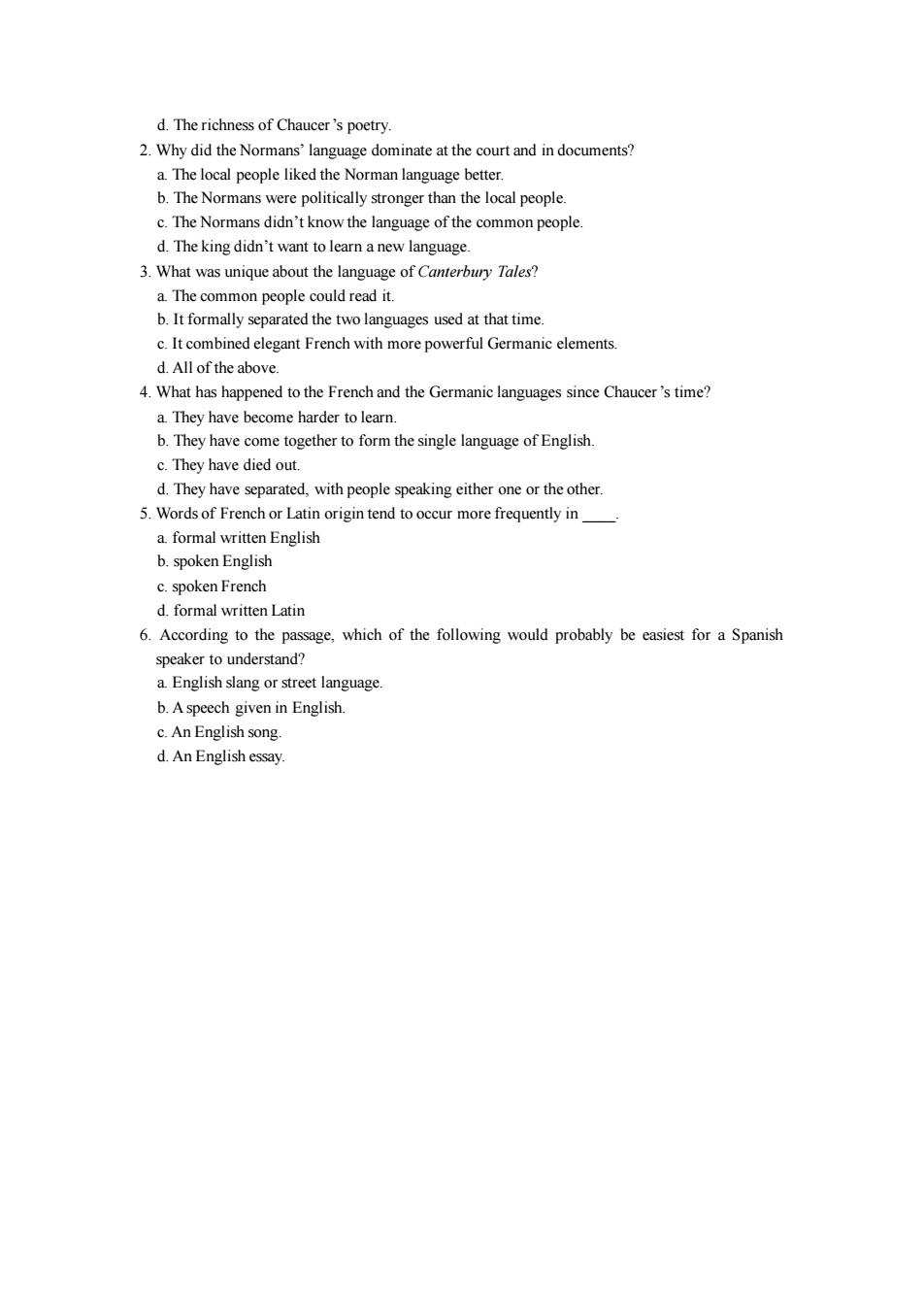
d.The richness of Chaucer's poetry 2.Why did the dominate at the in documen a.The local people liked the Norman language better. b.The Normans were politically stronger than the local people c.The Normans didn't know the language of the common people d.The king didn't want to learn a new language. 3.What was unique about the language of Canterbuy Tales? a The common people could read it b.It formally separated the two languages used at that time c.It combined elegant French with more powerful Germanic elements. d All of the above 4.What has happened to the French and the Germanic languages since Chaucer's time? a They have become harder b.They have come together to form the single language of English c.They have died out d.They have separated,with people speaking either one or the other. 5.Words of Frenchor Latin origin tend tooccur more frequently in a formal written English b.spoken English c.spoken French d formal written Latin 6.According to the passage,which of the following would probably be easiest for a Spanish speaker to understand? b.Aspeech given in English. c.An English song. d.An English essav
d. The richness of Chaucer’s poetry. 2. Why did the Normans’ language dominate at the court and in documents? a. The local people liked the Norman language better. b. The Normans were politically stronger than the local people. c. The Normans didn’t know the language of the common people. d. The king didn’t want to learn a new language. 3. What was unique about the language of Canterbury Tales? a. The common people could read it. b. It formally separated the two languages used at that time. c. It combined elegant French with more powerful Germanic elements. d. All of the above. 4. What has happened to the French and the Germanic languages since Chaucer’s time? a. They have become harder to learn. b. They have come together to form the single language of English. c. They have died out. d. They have separated, with people speaking either one or the other. 5. Words of French or Latin origin tend to occur more frequently in ____. a. formal written English b. spoken English c. spoken French d. formal written Latin 6. According to the passage, which of the following would probably be easiest for a Spanish speaker to understand? a. English slang or street language. b. A speech given in English. c. An English song. d. An English essay